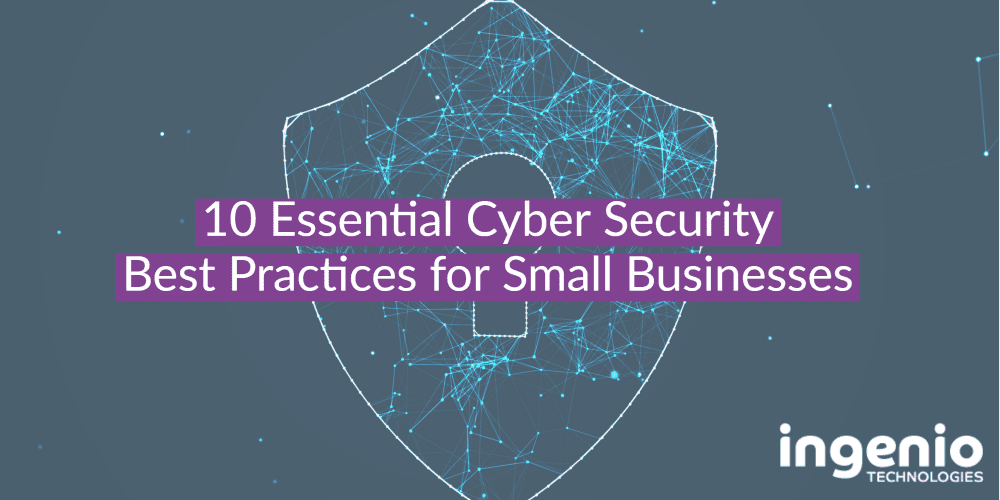Small businesses face a wide range of cyber security threats, including the following:
Valuable Data
Businesses often collect and store sensitive and valuable data, such as customer information, financial data, and intellectual property. Cybercriminals seek to steal this data to commit fraud, identity theft, and other financial crimes.
Financial Gain
Cybercriminals can profit from cyber-attacks by stealing data, demanding ransom payments, or using stolen information to commit fraud or extort money from the business.
Lack of Awareness
Many businesses lack awareness of the cyber security risks they face and often do not have adequate security measures in place to protect themselves.
Human Error
Employees can be a significant source of cyber security vulnerabilities. Human error, such as clicking on a malicious link or sharing sensitive data, can lead to security breaches.
Complexity of IT Systems
Businesses may have complex IT systems that are difficult to secure. These systems may include multiple devices and networks, which can be vulnerable to cyber-attacks.
Third-Party Vendors
Many businesses rely on third-party vendors for essential services, such as cloud storage or payment processing. These vendors may have access to sensitive data, making them potential targets for cyber-attacks.
Regulatory Compliance
Businesses may face regulatory data privacy and security requirements, such as the General Data Protection Regulation (GDPR) and the Payment Card Industry Data Security Standard (PCI DSS). Failure to comply with these regulations can result in significant financial penalties and damage to the business’s reputation.
Businesses face cyber security threats for several reasons, including holding valuable data, financial gain, lack of awareness, human error, the complexity of IT systems, third-party vendors, and regulatory compliance. However, by understanding these risks and implementing robust cyber security measures, businesses can protect themselves from cyber-attacks and safeguard their sensitive data.
With limited resources and budgets, small businesses may find it challenging to implement robust cyber security measures. Despite this, small businesses can implement several essential cyber security best practices to reduce their risk of cyber-attacks.
Cyber Security practices to implement:
1. Implement Strong Passwords
Weak passwords are one of the most common cyber security vulnerabilities. Small businesses should require employees to use strong passwords that are at least eight characters long and contain a mix of uppercase and lowercase letters, numbers, and special characters. Additionally, passwords should be changed regularly.
2. Conduct Employee Training
Employees are often the weakest link in a small business’s cyber security defences. Regular training can ensure employees recognise and respond to cyber threats, such as phishing attacks and social engineering tactics.
3. Implement Two-Factor Authentication
Two-factor authentication is an additional layer of security that requires users to provide two forms of identification before accessing an account. This can help prevent unauthorised access to sensitive data.
4. Maintain Up-to-Date Software
Outdated software can contain security vulnerabilities that cybercriminals can exploit. Small businesses should ensure that all software is up to date and that security patches are applied promptly.
5. Conduct Regular Backups
Regular backups can help small businesses recover from data loss caused by cyber-attacks or hardware failure. Backups should be stored securely and tested regularly to ensure they are working correctly.
6. Use Antivirus Software
Antivirus software can help detect and prevent malware infections. Small businesses should ensure that all devices, including computers and mobile devices, are protected by antivirus software.
7. Implement Access Controls
Access controls can help prevent unauthorised access to sensitive data. Small businesses should implement access controls that restrict access to sensitive data to authorised personnel only.
8. Use Encryption
Encryption can help protect sensitive data from unauthorised access. Small businesses should implement encryption technologies for data at rest and in transit, such as email encryption and full-disk encryption.
9. Conduct Vulnerability Assessments
Regular vulnerability assessments can help small businesses identify and remediate security vulnerabilities before cybercriminals exploit them.
10 Create a Cyber Security Incident Response Plan
Small businesses should create a cyber security incident response plan that outlines the steps to be taken in the event of a cyber-attack. The plan should include contact information for law enforcement, cyber security experts, and other stakeholders.
In conclusion, small businesses face a range of cyber security threats, and implementing robust cyber security measures can be challenging. However, by investing in these essential cyber security best practices, small businesses can reduce their risk of cyber-attacks and protect their sensitive data.
If you would like to discuss more about cyber security with experts, contact us on 01273 806211 or email hello@ingeniotech.co.uk


